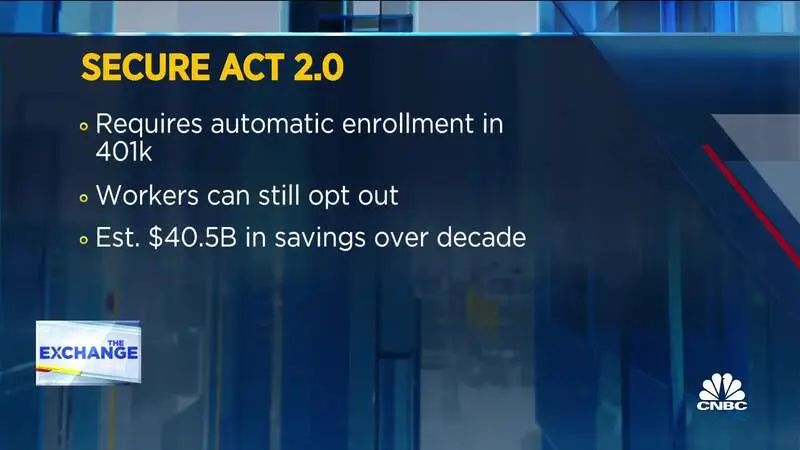
Tax-free rollovers from 529 plans to Roth individual retirement accounts may be allowed in 2024
Americans who save for college in 529 plans may soon have a way to rescue unused funds while keeping their tax benefits intact.
A $1.7 trillion government funding bill passed Thursday by the Senate has a provision that lets savers roll money from 529 plans to Roth individual retirement accounts free of income tax or tax penalties.
related investing news


The House is expected to pass the legislation Friday, before a deadline to avert a government shutdown.
More from Personal Finance:
10 ways to avoid the early withdrawal penalty for IRAs
Retirement savers with lower incomes may be getting a federal 'match'
'Best' ways to maximize your tax deduction for charitable gifts
The rollover measure — which, if it becomes law, would take effect in 2024 — has some limitations. Among the largest: There's a $35,000 lifetime cap on transfers.
"It's a good provision for people who have [529 accounts] and the money hasn't been used," said Ed Slott, a certified public accountant and IRA expert based in Rockville Centre, New York.
That might happen if a beneficiary — such as a child or grandchild — doesn't attend a college, university, vocational or private K-12 school, or other qualifying institution, for example. Or, a student may receive scholarships that mean some 529 funds are left over.
Millions of 529 accounts hold billions in savings
There were nearly 15 million 529 accounts at the end of last year, holding a total $480 billion, according to the Investment Company Institute. That's an average of about $30,600 per account.
529 plans carry tax advantages for college savers. Namely, investment earnings on account contributions grow tax-free and aren't taxable if used for qualifying education expenses like tuition, fees, books, and room and board.

However, that investment growth is generally subject to income tax and a 10% tax penalty if used for an ineligible expense.
This is where rollovers to a Roth IRA can benefit savers with stranded 529 money. A transfer would skirt income tax and penalties; investments would keep growing tax-free in a Roth account, and future retirement withdrawals would also be tax-free.
Some think it's a handout for the rich
However, some critics think the rollover policy largely amounts to a tax handout to wealthier families.
"You're giving savings incentives to those who can save and leaving behind those who cannot save," said Steve Rosenthal, a senior fellow at the Urban-Brookings Tax Policy Center.
A 2012 analysis conducted by the Government Accountability Office found the typical American with a 529 account had "much more wealth" than someone without: $413,500 in total wealth for the median person, about 25 times the amount of a non-accountholder.
You're giving savings incentives to those who can save and leaving behind those who cannot save.Steve Rosenthalsenior fellow at the Urban-Brookings Tax Policy Center
Further, the typical owner had a roughly $142,000 annual income versus $45,000 for other families, the GAO report said. Almost half, 47%, had incomes over $150,000.
The new 529-to-Roth IRA transfer provision doesn't carry income limits.
Limitations on 529-to-IRA transfers
While the new tax break would primarily benefit wealthier families, there are "pretty significant" limitations on the rollovers that would reduce that financial benefit, Jeffrey Levine, a certified financial planner and certified public accountant based in St. Louis, said in a tweet.
The restrictions include:
- A $35,000 lifetime cap on transfers.
- Rollovers are subject to the annual Roth IRA contribution limit. (The limit is $6,500 in 2023.)
- The rollover can only be made to the beneficiary's Roth IRA — not that of the account owner. (In other words, a 529 owned by a parent with the child as beneficiary would need to be rolled into the child's IRA, not the parent's.)
- The 529 account must have been open for at least 15 years. (It seems changing account beneficiaries may restart that 15-year clock, Levine said.)
- Accountholders can't roll over contributions, or earnings on those contributions, made in the last five years.
In a summary document, the Senate Finance Committee said current 529 tax rules have "led to hesitating, delaying, or declining to fund 529s to levels needed to pay for the rising costs of education."
"Families who sacrifice and save in 529 accounts should not be punished with tax and penalty years later if the beneficiary has found an alternative way to pay for their education," it said.
Are 529 plans already flexible enough?
Some education savings experts think 529 accounts have adequate flexibility so as not to deter families from using them.
For example, owners with leftover account funds can change beneficiaries to another qualifying family member — thereby helping avoid a tax penalty for non-qualified withdrawals. Aside from a kid or grandkid, that family member might be you; a spouse; a son, daughter, brother, sister, father or mother-in-law; sibling or step-sibling; first cousin or their spouse; a niece, nephew or their spouse; or aunt and uncle, among others.
Owners can also keep funds in an account for a beneficiary's graduate schooling or the education of a future grandchild, according to Savingforcollege.com. Funds can also be used to make up to $10,000 of student loan payments.
The tax penalty may also not be quite as bad as some think, according to education expert Mark Kantrowitz. For example, taxes are assessed at the beneficiary's income-tax rate, which is generally lower than the parent's tax rate by at least 10 percentage points.
In that case, the parent "is no worse off than they would have been had they saved in a taxable account," depending on their tax rates on long-term capital gains, he said.






